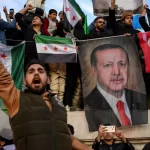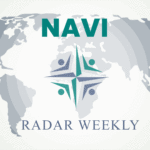Subscribe to NAVI Radar Weekly here
Focus Point: Security and Defense Policy- Defense Discussions
The new NATO Force Model: ready for launch? | NATO Defence College
John R. Den| 27.05.2024
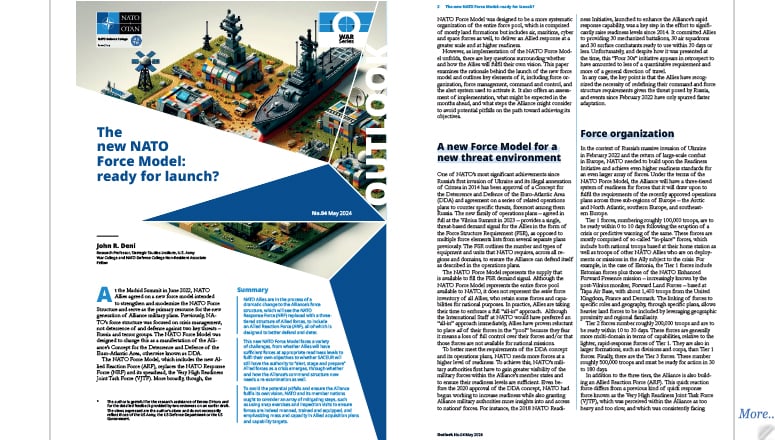
NATO Allies are in the process of a dramatic change to the Alliance’s force structure, which will see the NATO Response Force (NRF) replaced with a three-tiered structure of Allied forces, to include an Allied Reaction Force (ARF), all of which is designed to better defend and deter.
This new NATO Force Model faces a variety of challenges, from whether Allies will have sufficient forces at appropriate readiness levels to fulfill their own objectives to whether SACEUR will still have the authority to “alert, stage and prepare” Allied forces as a crisis emerges, through whether and how the Alliance’s command structure now needs a re-examination as well.
To avoid the potential pitfalls and ensure the Alliance fulfils its own vision, NATO and its member nations ought to consider an array of mitigating steps, such as using snap exercises and inspection visits to ensure forces are indeed manned, trained and equipped, and emphasizing mass and capacity in Allied acquisition plans and capability targets. Read more…
Focus Point: Security and Defense Policy- Russia-Ukraine War
West should rethink restrictions on weapons for Ukraine: NATO chief | Euronews
Joshua Askew| 27.05.2024
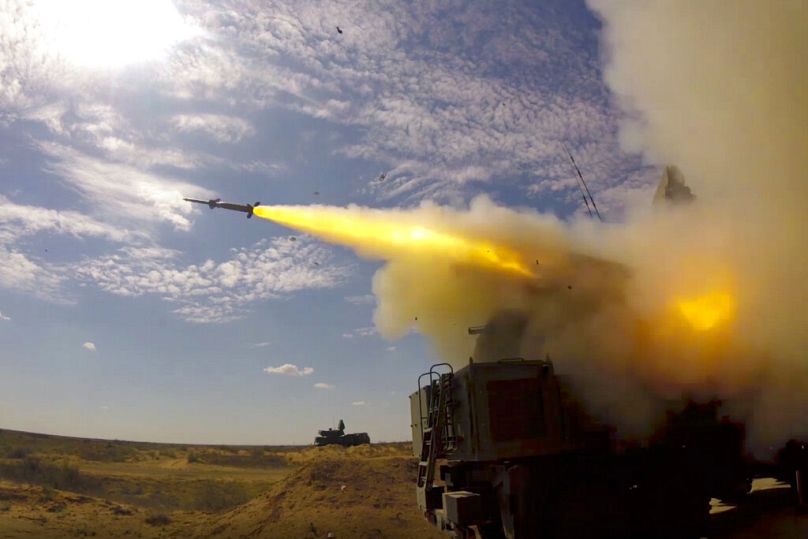
Speaking on Monday, NATO chief Stoltenberg said some states within the US-military alliance had lifted restrictions on providing specific weapons to Ukraine, though others had not.
National decisions, not NATO decisions
He called on those continuing to limit their arms supplies to reconsider their position, citing the “nature of the fighting taking place in Kharkiv.”
“By having too many restrictions, we are tying one hand of the Ukrainian armed forces on their back because they are reducing their capability to defend themselves.”
“But again, these are national decisions, not NATO decisions,” he added. Read more…
Focus Point: Security and Defense Policy- Great Power Competition
America breaks global rules as it defends the free world | FT
Gideon Rachman| 27.05.2024| Subscription needed

Russia and China always argue that their actions are consistent with international law — even when they blatantly are not. The US will sometimes have to do the same thing. International lawfare is part of the emerging struggle between democratic and authoritarian powers.
That does not mean that the two sides are on the same moral level. As in the cold war and the earlier struggles of the 20th century, the world’s democracies do not need to apologise for being ruthless in defence of free societies.Read more…
Focus Point: Regional Security- Indo-Pacific Security
The Japan-China-ROK Summit |NAVI
NAVI | 28.05.2024

The Japan-China-ROK Summit took place in Seoul, Republic of Korea, on 27 May 2024 for the first time since 2019.
The 9th Trilateral Summit among South Korea, Japan, and China reaffirmed their unwavering commitment to regular summits and cooperation across six key areas: people-to-people exchanges, sustainable development, economic cooperation, public health, science and technology, and disaster relief.
The leaders, in a show of solidarity, emphasized the importance of adhering to international law, supporting the United Nations, and fostering regional peace and stability, ensuring a secure and prosperous future for our region.
Following the conclusion of the summit, the Joint Declaration for the 9th Summit, along with its attachments—the Joint Statement on a 10-Year Vision for Trilateral IP Cooperation and the Joint Statement on Future Pandemic Prevention, Preparedness, and Response—were made available for public viewing. Read more…
Focus Point: Regional Security- Middle East
Spain, Ireland and Norway have recognized Palestinian statehood. Where does Europe stand on the issue? | CNN
CNN| 28.05.2024
Countries that have recognized a Palestinian state
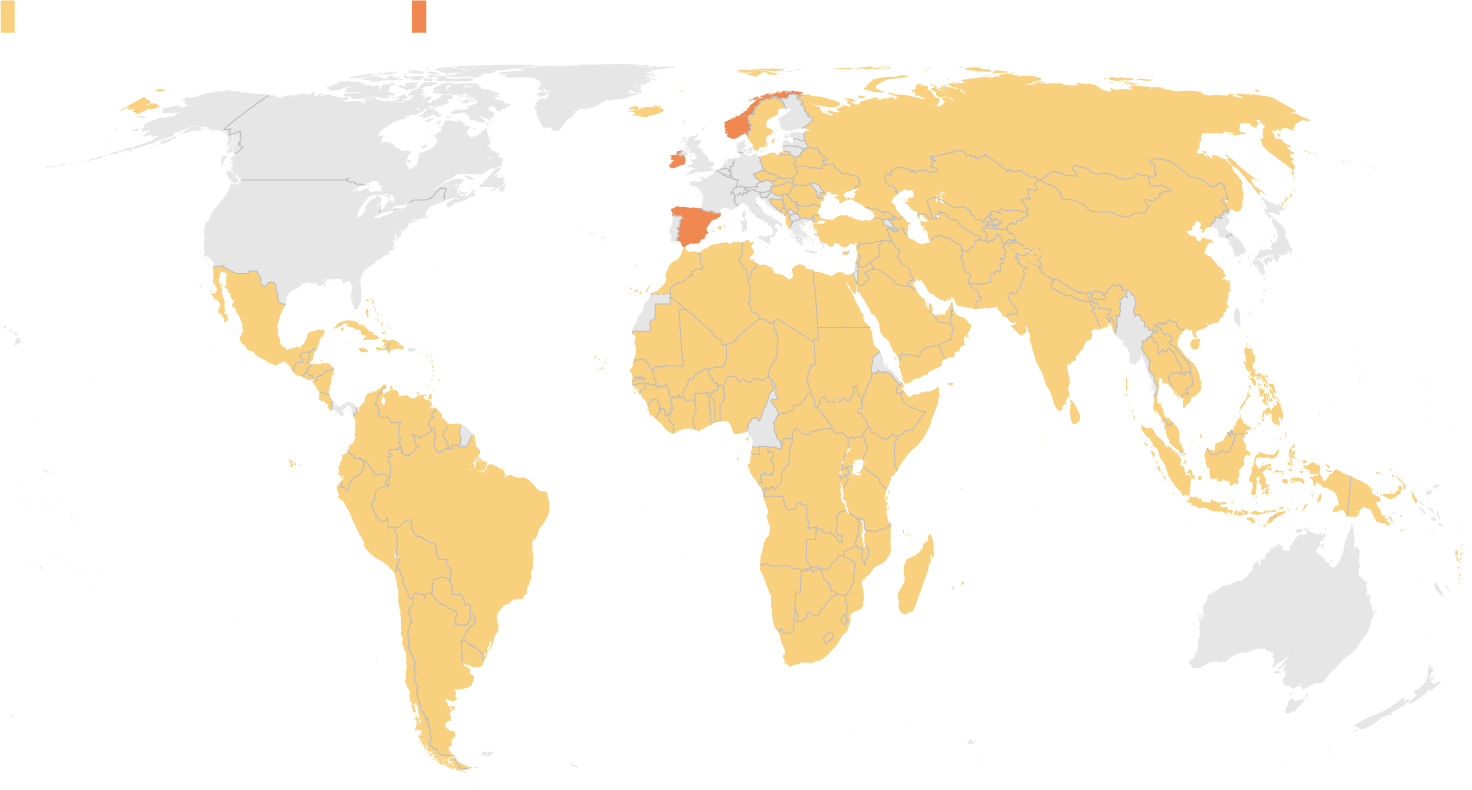
Spain, Ireland and Norway formally recognized Palestinian statehood on Tuesday, cementing a joint move that further isolates Israel over its war against Hamas in Gaza.
The move also highlights just how split Europe is on whether to recognize Palestinian statehood.
A majority of countries around the world do so, and reaffirmed that stance this month in a United Nations resolution in support of Palestinian membership that passed with the support of 143 nations.
Spain, Norway and Ireland formally recognize a Palestinian state
They have joined more than 140 countries that have recognized a Palestinian state since 1988. None of the G7 countries — United States, United Kingdom, Canada, France, Germany, Italy or Japan — do. Read more…
Focus Point: Security and Defense Policy- Russia-Ukraine War
Germany and France agree Ukraine may strike Russian military targets | Euronews
Sophia Khatsenkova and Liv Stroud | 29.05.2024
The German Chancellor Olaf Scholz and the French President Emmanuel Macron showed their joint support for Ukraine during a Franco-German defence and security council in Meseberg on Tuesday.
Whilst Chancellor Scholz had previously been firm on Ukraine not using Western weapons to strike Russian targets, he made a step in the direction of Macron, on the third and last day of the French president’s historic state visit to Germany.
Both leaders put their disagreements aside and compromised on the divisive subject of EU defence. Read more…
Focus Point: Regional Security- Transatlantic Security-European Security
Fact-check: Is the EU setting up a European army? | Euronews
James Thomas| 29.05.2024
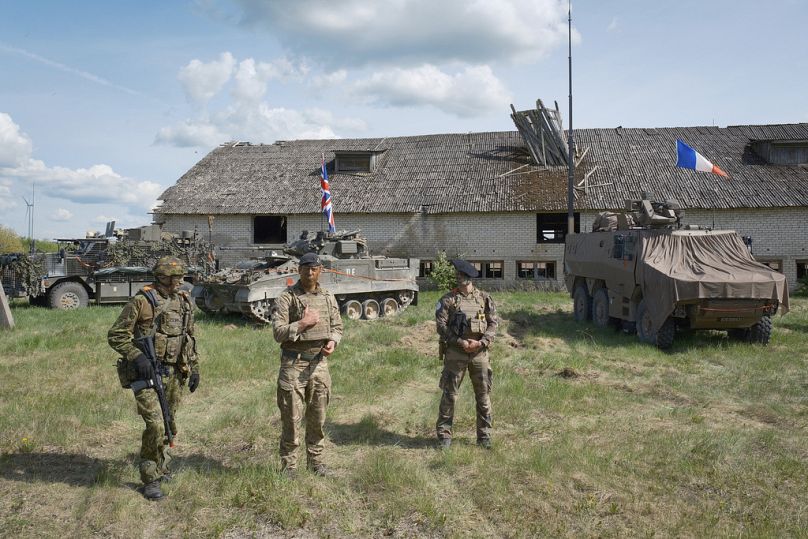
The idea that the European Union has created or is creating a pan-European army that will conscript citizens from member states is often used to attack the bloc’s leadership and general direction.
Is there any truth in this? To put it simply: no, there’s no such thing as an EU army, and nor will there be one in the near future.
It’s typically peddled by right-wing parties and Eurosceptics active on social media to accuse the EU of attacking its members’ sovereignty.
But many proponents of “ever closer union” also invoke the idea, arguing that a European army as a way the continent can better defend itself and reduce its reliance on the US.
One of the best examples of EU army scare stories came during the Brexit debate, when “Leave” supporters whipped up fears of British citizens being drafted into a Europe-wide military force without any having say in the matter.
Is there any truth in this? To put it simply: no, there’s no such thing as an EU army, and nor will there be one in the near future. Read more…
Focus Point: Regional Security- Transatlantic Security-NATO
Who will be next NATO secretary general | Euronews
Jack Schickler | 30.05.2024
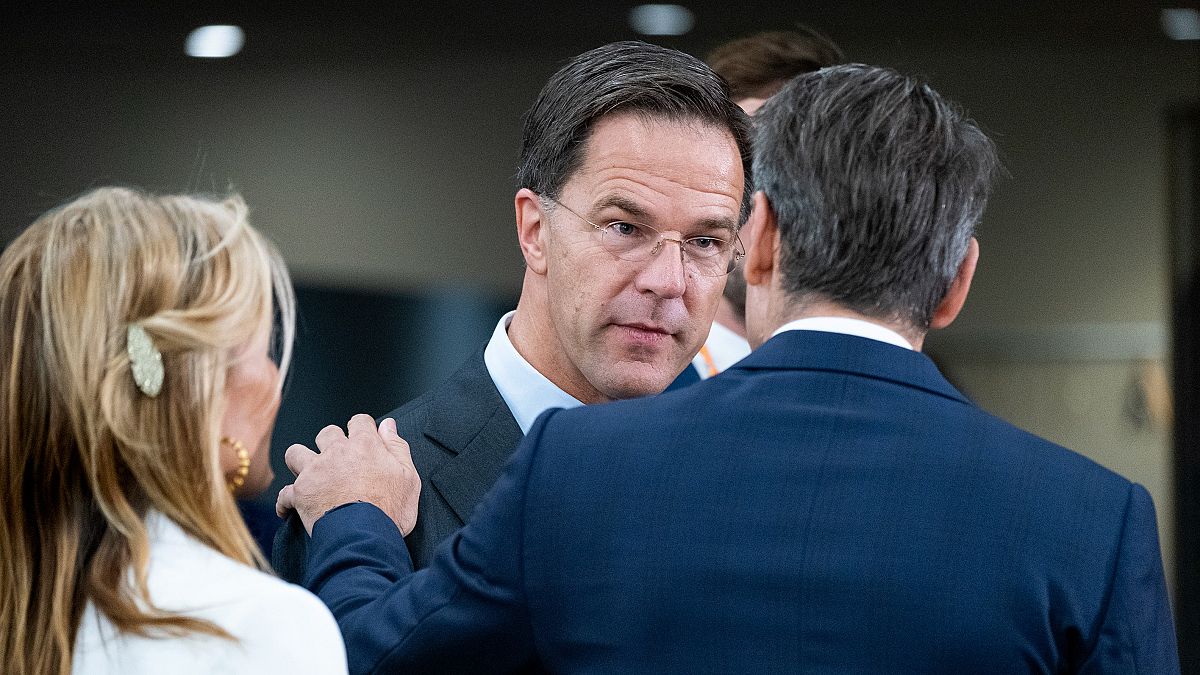
Euronews examines contenders and challenges for the top military post – with Mark Rutte’s coronation still not guaranteed.
Foreign ministers from NATO countries are gathering in Prague, Czechia, today and tomorrow (30-31 May).
Over them looms the major decision of who should lead the transatlantic alliance in the coming years.
Norway’s Jens Stoltenberg, who took office in 2014, has already seen his term extended four times, and is due to step down on 1 October.
Allies have nearly converged on a choice, but there are still obstacles in the way.
Their decision comes at a key time for the transatlantic military alliance, as it faces up to the threat of an increasingly belligerent Russia and a second Trump presidency.
How does NATO select its Secretary General?
The Secretary General is NATO’s top civil servant, selected by consensus of the military pact’s members.
He – and historically it always has been a man – chairs NATO’s major committees, acts as spokesperson and recruits international staff.
In practice selection for the role takes place via informal diplomatic channels – but finding a candidate amenable to all 32 allies isn’t easy.
By longstanding tradition that’s now more or less formalised, the job is held by a European senior political figure, and the usual term length is four years.
Who are the candidates?
One candidate is leading the field by far – Mark Rutte, who’s been Prime Minister of the Netherlands since 2010.
His candidacy has so far gained support from 29 of the defence alliance’s 32 members, including the most influential, the US.
Rutte will likely halt his day job pretty soon. After months of post-election talks among four coalition partners, former spy chief Dirk Schoof seems set to be named as the next Dutch Prime Minister – meaning Rutte could step down within weeks.
As leader of the liberal VVD party, Rutte has successfully managed a series of tricky coalitions in the highly fractured world of Dutch politics – though VVD’s latest decision to ally with Geert Wilder’s far-right PVV is stoking controversy.
But he’s not the only candidate out there. Romanian President Klaus Iohannis still has his name in the ring after putting himself forward in March – though he has far fewer backers than Rutte.
Other potential nominees, including Estonian Prime Minister Kaja Kallas and the UK’s then-Defence Minister Ben Wallace, have now counted themselves out of the race, and both now support Rutte. Read more…
Focus Point: Security and Defense Policy- Russia-Ukraine War
NATO foreign ministers discuss restrictions on Ukraine using their weapons to attack Russia | Euronews
Euronews with AP and EBU | 30.05.2024 | A Must-Read
NATO’s foreign ministers met to discuss whether to allow Ukraine to use their weapons to launch strikes on Russian territory.
The two-day gathering in Prague focused on the question of potentially lifting restrictions that have so far limited Ukraine’s ability to inflict damage across the Russian border.
So far the West has refrained from allowing its weapons to be used for that purpose for fear of escalating the conflict into a wider war with Russia, but the issue is increasingly divisive.
Unlike Germany or the US, French president Emmanuel Macron has vocally supported lifting the restrictions and has even refused to rule out sending French troops to Ukraine. Read more…
Focus Point: Regional Security- Indo-Pacific Security
EU-China Non-Proliferation and Disarmament Dialogue takes place in Beijing | EEAS
The EU-Delegation of the European Union to the People’s Republic of China| 30.05.2024

EU-China Non-Proliferation and Disarmament Dialogue takes place in Beijing
On 30 May, the EU-China Non-Proliferation and Disarmament Dialogue took place in Beijing.
The EU Special Envoy for Non-proliferation and Disarmament and Special Adviser on Iran Nuclear Issue, Ambassador Stephan Klement and the Director General of Arms Control of China’s Ministry of Foreign Affairs held a constructive and frank exchange on many important current issues.
During the meeting, discussions touched upon the Russian aggression in Ukraine, North Korea, Iran, Artificial Intelligence, the Review Process of the Treaty on the Non-Proliferation of Nuclear Weapons, among other. Read more…
Focus Point: Regional Security- Transatlantic Security-NATO
Secretary General welcomes NATO’s deepening partnerships in the Indo-Pacific region | NATO
NATO | 30.05.2024
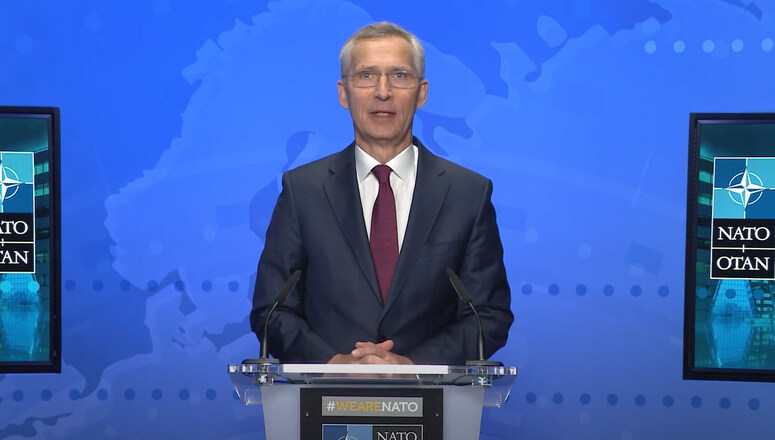
“The challenges we face are global, they require a global response. For this reason, NATO is working ever more closely with partners around the world”
On Thursday (30 May 2024), NATO Secretary General Jens Stoltenberg highlighted the importance of partnerships and global cooperation in a video message to the Jeju Forum for Peace and Prosperity in the Republic of Korea. “The challenges we face are global,” he said, “they require a global response. For this reason, NATO is working ever more closely with partners around the world”.
The Secretary General welcomed NATO’s deepening partnerships in the Indo-Pacific region with South Korea, Australia, Japan, and New Zealand who are among NATO’s closest partners. Mr Stoltenberg underlined NATO’s commitment to deepen practical cooperation with Indo-Pacific partners in several practical areas, including cyber defence, counter-disinformation, and emerging technologies.
The Republic of Korea is an important and long-standing NATO partner. This partnership was further strengthened with the establishment of an Individually Tailored Partnership Programme in July 2023. This is the first time that NATO has engaged with the Jeju Forum, which brings together academics, politicians, and business leaders from across the world to promote international cooperation. Read more…
Focus Point: Security and Defense Policy- Russia-Ukraine War
NATO Secretary General in Prague: Allies must maintain support to Ukraine “for as long as necessary” | NATO
NATO | 31.05.2024
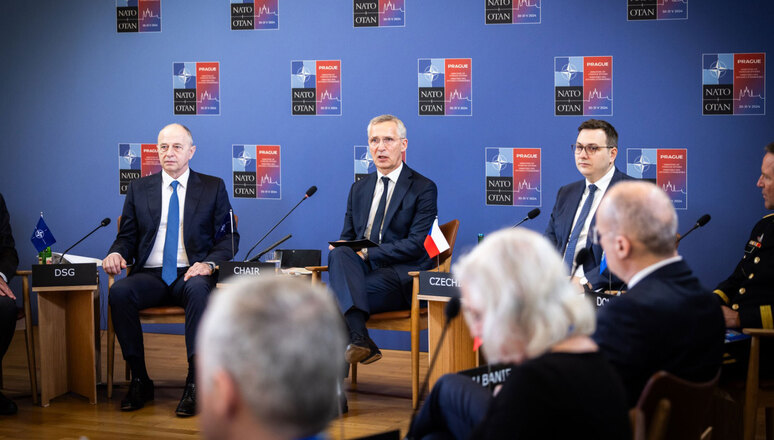
NATO Foreign Ministers concluded two days of meetings and events in Prague, Czechia on Friday (31 May 2024) with an informal session of the North Atlantic Council. In a meeting chaired by NATO Secretary General Jens Stoltenberg, Allies made progress on preparations for the Washington Summit in July and agreed that providing support to Ukraine should remain a top priority
“Allies have provided approximately 40 billion euros worth of military aid to Ukraine each year.”
Speaking after the Council, the Secretary General said that NATO will take a greater coordination role in providing equipment and training to Ukraine, saying this would “provide more predictability for Kyiv and address both immediate and longer-term needs.” He highlighted the fact “practically all military aid to Ukraine – 99 percent – comes from NATO Allies” affirming it made sense that NATO should play “a greater role” in these efforts. The Secretary General has also proposed a multi-year financial pledge for Ukraine.
“Russia must understand that it cannot wait us out,” the Secretary General said highlighting the fact that since Russia’s full-scale invasion in 2022, “Allies have provided approximately 40 billion euros worth of military aid to Ukraine each year.” Mr Stoltenberg emphasised that, in order to accelerate the end of the war, NATO members must maintain “at least” current levels of support to Ukraine “for as long as necessary.” Read more…
Focus Point: Regional Security- Transatlantic Security-NATO
NATO wraps up its largest exercise since the Cold War | NATO
NATO | 31.05.2024
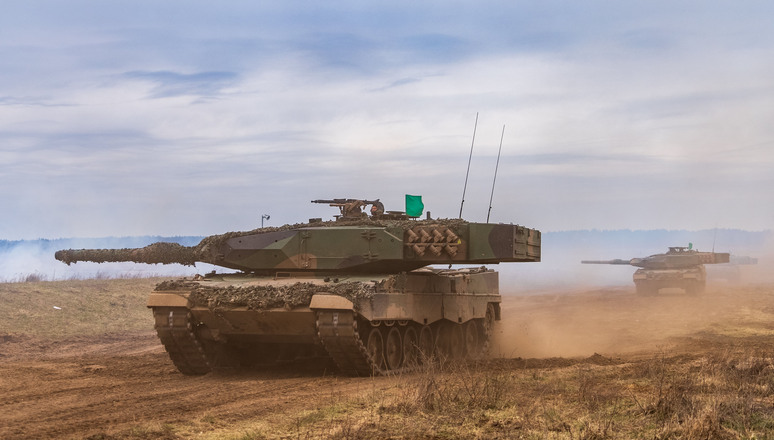
NATO’s largest exercise in decades, Steadfast Defender 2024, concluded on Friday (31 May 2024). During the four-month exercise, Allies demonstrated how they can deploy forces from both sides of the Atlantic rapidly across the Alliance. Approximately 90,000 troops, over 80 aircraft, 50 ships and 1,100 combat vehicles took part in the exercise.
Full story on the SHAPE website:https://shape.nato.int/news-releases/steadfast-defender-24-concludes
Focus Point: Regional Security- Transatlantic Security-NATO
Chair of the NATO Military Committee attends the Shangri-La Dialogue | NATO
NATO | 02.06.2024 | A must read
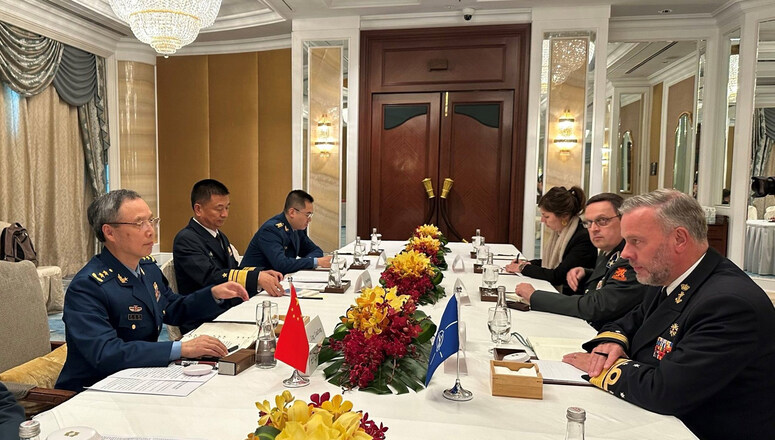
From 30 May until 2 June 2024, Admiral Rob Bauer, Chair of the NATO Military Committee participated in the Shangri-La Dialogue in Singapore. While attending the Dialogue, Admiral Bauer met with senior political and military officials from China, New Zealand, Singapore, South Korea, Switzerland and the United States. Admiral Bauer spoke at a panel session on AI, Cyber Defence and Future Warfare. And delivered a keynote address at the Indo Pacific Forum, alongside the Japanese Minister of Defence.
In a panel discussion on AI, Cyber Defence and Future Warfare, Admiral Bauer expressed his concerns on the unrestricted use of new technologies on the battlefield:
“Throughout military history, every new technological advancement has increased our ability to destroy. On a larger scale. With a higher speed. And with greater precision. But as technology is increasing our ability to destroy… our ability to regulate is rapidly decreasing. The question is: where can this lead to? How big can the divide become? If the tectonic plates of power are shifting, and the world is split up into several parallel systems with different sets of rules… can they co-exist?”
Admiral Bauer stressed that after two world wars, a worldwide belief arose that great power struggle should never again be fought on the battlefield and that weapon systems needed to be regulated and controlled. “I truly hope that we don’t need to re-learn that lesson again. And that we don’t combine high tech weaponry with medieval lawlessness and impunity. Because there is nothing “modern” about that.” Read more…
Thank you very much for reading.
The NAVI Research Institute is the research division of NATO Veterans Initiative - NAVI that provides a unique perspective to transatlantic leaders and societies on peace and security through the lens of NATO's founding principles of rule of law, democracy, human rights, and individual liberties. The NAVI Research Institute was officially established by the NAVI Board on July 16th, 2023.
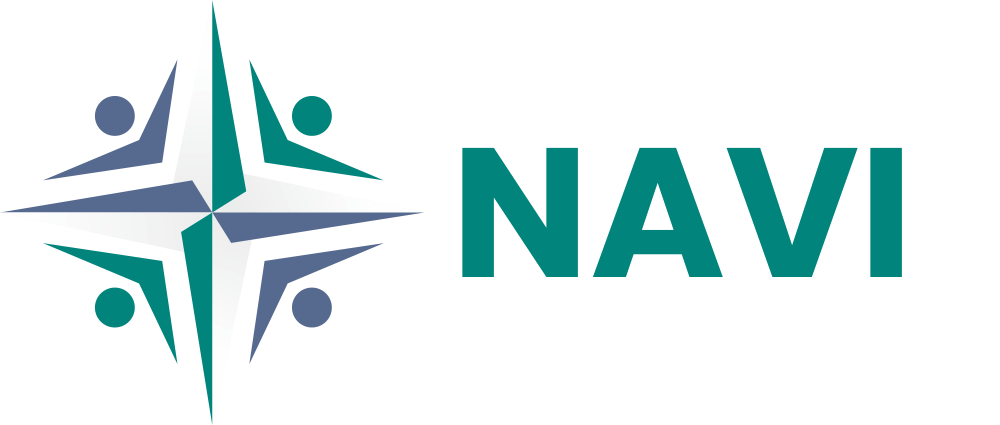
![NAVI-PROJE-[Recovered] Radar Weekly](https://nato-veterans.org/wp-content/uploads/2024/05/NAVI-PROJE-Recovered-696x392.gif)
